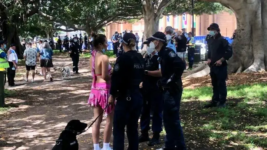Drug Summit Recommends Prohibiting Sniffer Dogs and Strip Searches at Music Festivals

The last week released NSW Drug Summit 2024 report recommended 56 priority actions be undertaken in this state to improve the issue of illicit drugs and the harms associated, with the final one being the cessation of the use of drug detection dogs and strip searching for suspected drug possession at festivals with pill testing services and potentially extending this to all such events.
After a decade of denial, NSW held its first sanctioned pill testing trial at a festival in Wollongong in March. However, the much-welcomed development was sullied by the counterproductive appearance of walls of NSW police officers accompanied by drug detection dogs, as these types of operations are known to lead festivalgoers to partake in potentially lethal drug taking practices.
Summit cochairs Carmel Tebbutt and John Brogden have recommended that contemplation of the removal of drug dogs and further, traumatic strip searches from the festival equation, on the back of countless news reports and official inquires having called out the illegal and abusive way officers on-the-beat carry out strip searches, as they don’t often appear to understand basic protocols.
So, the drug summit recommendation regarding drug dogs and strip searches doesn’t appear out of leftfield. Indeed, the Special Commission of Inquiry into the Drug ‘Ice’ recommended removing the dogs from festivals and limiting strip search use in 2020, while the 2019 NSW coronial inquiry into NSW festival deaths too called for ending the use of the dogs and strip searches at these events.
And while the commencement of pill testing tends to forebode the removal of potentially lethal police operations preventing access to a potentially lifesaving health intervention, there are clear arguments for the removal of the warrantless use of dogs and strip searches in public in general.
The limits to policing drug use
In their 3 April released report, Tebbutt and Brogden outline that while policing of illicit substances is important in terms of drug supply, there was a sense amongst the over 550 individuals and 250 organisations involved in the summit program that “many policing programs are disproportionate to the risk and harms that drugs cause” and that they exceed community expectations.
“The impact of these practices on trust in policing, especially for Aboriginal people and young people… was of particular concern,” the former NSW politicians continued. “The underlying principle of treating drug use as a health issue, rather than a criminal one, was at the core of these discussions.”
The Drug Summit cochairs found that most forum attendees “strongly opposed” strip searching people over personal drug possession, with “psychological trauma, particularly for vulnerable populations” being seen as a major harm, while health professionals asserted such searches cause “unnecessary harm”, damage trust with police and create barriers to seeking help with drug use.
“Many attendees called for an end to using drug detection dogs, noting that the threat of detection and arrest can lead to panic consumption, potentially causing harm,” the report explains. “They also noted that using detection dogs at festival entrances was problematic. There was a strong sense that police in riot uniforms with drug detection dogs was not commensurate with possession offences.”
NSW reformists have been raising the negative effect of dogs at festivals since 2013, prior to the major roll out of accompanying strip searches, and the dangerous drugtaking practices identified are preloading, or taking all drugs before arrival, along with panic overdosing, or fatally consuming drugs on sight of police, as well as the practice of hiding drugs in cavities using packaging such as condoms.
The death of James Munro at 2013’s Defqon.1 was thought to be a case of panic overdose, while Alexandra Ross-King is considered to have lost her life at the 2019 FOMO event, after preloading prior to the festival.
Get sniffed
A 2011-launched initiative by Greens Senator David Shoebridge and the NSW Young Greens, the Sniff Off campaign advocates for the removal of the warrantless use of drug detection dogs in public. This includes ending drug dog use at festivals. However, the campaign recognises that citizens using public transport or going out for a night on the town do not deserve to be subjected to random searches.
Police began using dogs in public in 2002, while prior to this transport and festivals didn’t involve potential dogs or strip searches. A 2006 Ombudsman review found that dog indications only resulted in illegal drugs located on 30 percent of occasions. And statistics obtained by Shoebridge over the latter years of the 2010s, revealed the dogs get it wrong two-thirds to three-quarters of the time.
As a NSW Greens MLC, Shoebridge identified a rise in strip searches being used to accompany failed pat down searches following a sniffer dog indication in 2014, while this use had spiked by 47 percent over the four years to June 2019. And strip searches, both performed following a dog indication or in general out on the beat, were failing to turn up anything illegal on 64 percent of occasions.
In late 2018, the NSW police watchdog, the Law Enforcement Conduct Commission, announced it was launching a major investigation into strip search use at festivals, due to the large number of complaints it had been receiving, and this culminated in a major December 2020 strip search inquiry report that identified numerous unlawful and abusive applications of strip searches upon teens.
“Vague and legalistic” police protocols
“To ensure community safety, strip searches and drug detection dogs should be banned permanently,” said Redfern Legal Centre senior police accountability solicitor Sam Lee.
“Evidence shows that these humiliating and intimidating practices do not make festivals safer,” she continued, “in fact, they often encourage risky behaviours, such as preloading.”
Redfern Legal Centre has been one of the key organisations calling out the illegitimate use of drug dogs in public spaces, along with the often illegally applied and mass use of strip searches not only at festivals but by cops on the beat who appear to have no clear understanding of the limits of what they can order a subject to do when they are being strip searched.
The NSW police strip search protocols are set out in part 4 division 4 of the Law Enforcement (Powers and Responsibilities) Act 2002 (NSW) or the LEPRA.
Lee told Sydney Criminal Lawyers in 2019 that the laws need tightening, as “the legislation directing strip searches is quite vague and legalistic”, and this “allows police to widely interpret when they should instigate such a search”. Yet, these issues continue into the present.
“We need legislative change to make it clear that strip searches should never be conducted based on suspicion of minor drug possession – not just at music festivals or during the drug testing trial, but permanently,” the lawyer said in concluding.







